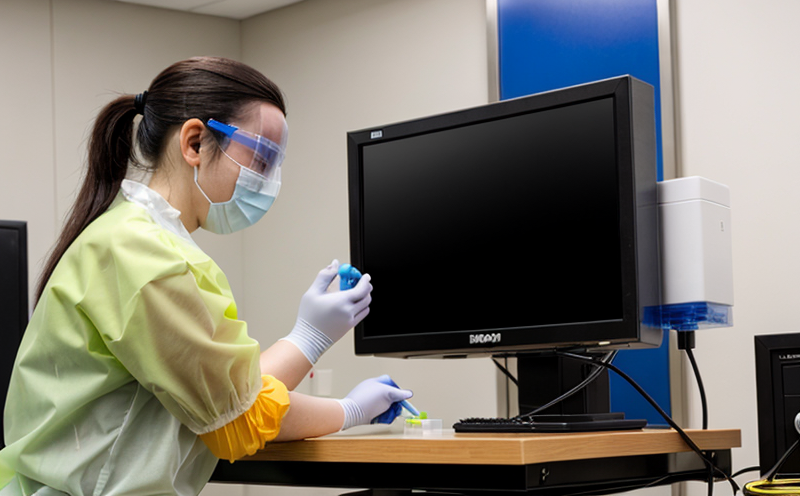Biocompatibility Testing of Orthopedic Implants
The biocompatibility testing of orthopedic implants is a critical process aimed at ensuring that medical devices do not harm patients when in contact with biological tissues. This service, provided by Eurolab, ensures compliance with regulatory standards and supports the development of safe and effective medical products.
Orthopedic implants such as artificial joints, spinal fusion devices, bone screws, and plates are subjected to rigorous testing to assess their compatibility with human tissue. The primary goal is to evaluate whether these materials will induce adverse reactions or foreign body responses, which could compromise the effectiveness of the implant.
The process begins with detailed specimen preparation tailored to the specific type of orthopedic implant. Eurolab's experienced technicians prepare samples following stringent protocols that ensure accurate and reproducible results. The testing environment is controlled to mimic physiological conditions as closely as possible.
Biocompatibility testing typically involves a series of tests designed to assess different aspects of material interaction with biological systems:
- In Vitro Cytotoxicity Tests: These tests evaluate the potential for cell death or damage due to direct contact between the implant and cells in culture.
- Genotoxicity Testing: This involves assessing whether the material causes any genetic mutations that could lead to cancerous changes.
- Immune Reactions: Tests are conducted to determine if the implant triggers an immune response, which can indicate potential issues with patient acceptance and integration.
- Release of Pyrogenic Substances: This assesses whether the material releases harmful substances that could cause fever or other inflammatory reactions in patients.
The choice of test depends on the type of implant and its intended use. For instance, hip replacements require different tests compared to spinal fixation devices due to their distinct anatomical locations and mechanical functions within the body.
Once the testing is complete, Eurolab's team provides detailed reports that include comprehensive data analysis and interpretation. These reports are essential for regulatory submissions and ensure compliance with international standards such as ISO 10993-1:2018 and ASTM F713-16.
Compliance with these standards is crucial because it ensures that the orthopedic implants meet rigorous safety requirements set by regulatory bodies like the FDA (Food and Drug Administration) and EMEA (European Medicines Agency).
Benefits
- Regulatory Compliance: Ensures that all orthopedic implants meet stringent biocompatibility requirements.
- Patient Safety: Reduces the risk of adverse reactions and improves overall patient outcomes.
- Enhanced Product Quality: Identifies potential issues early in the development process, leading to safer products.
- Increased Market Confidence: Builds trust with healthcare providers and patients regarding product safety.
The comprehensive nature of biocompatibility testing provides multiple layers of assurance that orthopedic implants are safe for use. This service is vital in maintaining high standards of medical device quality, which ultimately contributes to better patient care and improved health outcomes.
Eurolab Advantages
Eurolab's expertise in biocompatibility testing sets it apart as a leader in this field. Our team of experienced scientists and engineers brings extensive knowledge and advanced instrumentation to ensure accurate and reliable results.
- State-of-the-Art Facilities: Equipped with the latest technology for precise specimen preparation and analysis.
- Experienced Professionals: Our staff includes experts in biocompatibility testing who are well-versed in international standards.
- Comprehensive Reporting: Detailed reports that provide a clear understanding of test results, facilitating informed decision-making.
We pride ourselves on providing not just reliable data but also actionable insights that guide our clients towards successful product development and regulatory approval. Our commitment to excellence ensures that every orthopedic implant undergoes thorough evaluation, contributing to the advancement of medical technology.
Competitive Advantage and Market Impact
The biocompatibility testing service offered by Eurolab provides a significant competitive edge in the orthopedic implant industry. By ensuring that all products meet or exceed regulatory standards, we enable our clients to confidently enter markets where compliance is critical.
- Market Leadership: Our reputation for delivering high-quality, reliable results positions us as a trusted partner for medical device manufacturers.
- Innovation Support: We assist in the development of new and improved orthopedic implants that meet evolving patient needs.
- Risk Management: By identifying potential issues early, we help minimize costly rejections during later stages of product development.
The demand for safe and effective medical devices continues to grow as the population ages. Eurolab's biocompatibility testing service is integral in meeting this demand by providing essential data that supports regulatory submissions and clinical trials. This not only enhances our clients' products but also contributes positively to the broader market, fostering innovation and trust.





